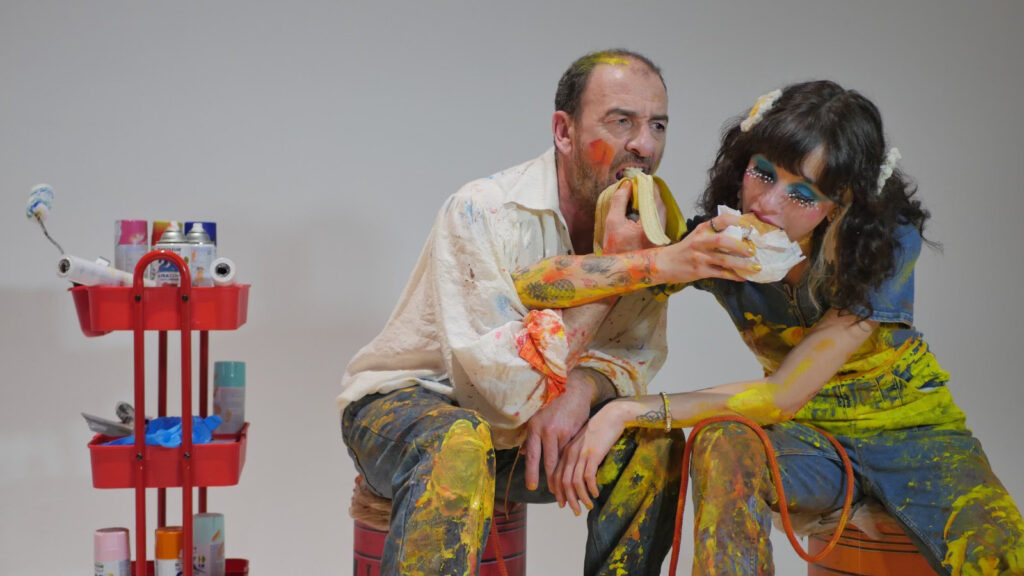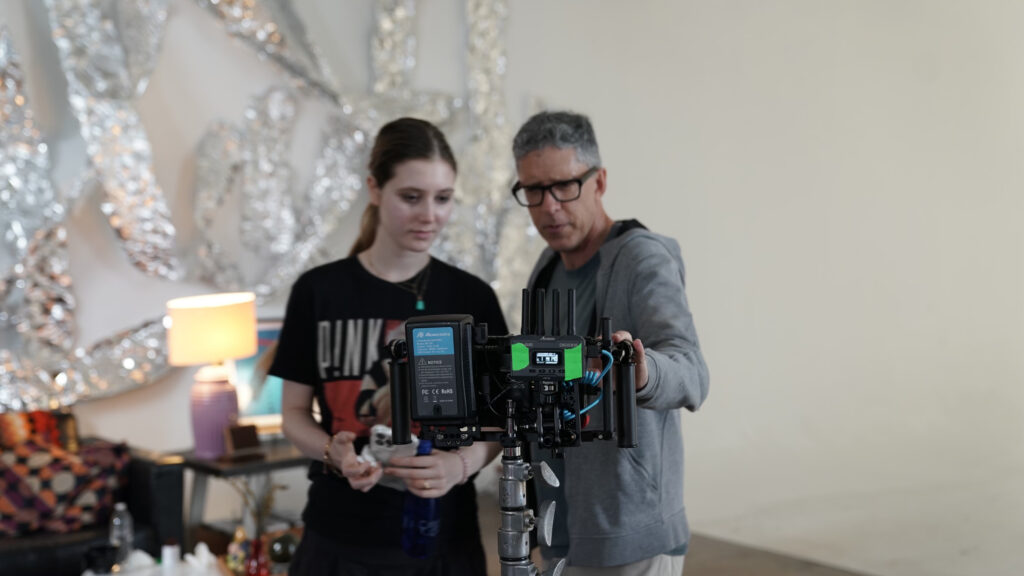
UM students and aspiring filmmakers Chiara Padejka and Evan Friedmann are working with fellow students to produce “COLLAGE,” the University’s first-ever undergraduate feature film.
In their fictional mockumentary, videographer David Torres records artists Luna Monroe and Vasil Daskalov tied together by a rope for a year-long creative experiment. Torres captures every second of the artist’s joy and heartbreak as they test humanity’s ability to coexist.
Dimiter D. Marinov, from Apple TV’s “For All Mankind,” Indy Shorts’ “Pickled Herring” and the Oscar-winning film “Green Book,” will star as Daskalov. New York avant-garde model and actress Carl Nowak joins him as Monroe with filmmaker Gavin Hulberg as David.
The filmmakers reached Marinov’s agent to send their dream actor the “COLLAGE” script. Since then, Marinov has championed the project. Nowak’s unique charisma and dynamic performance made her stand out in the nationwide casting call.
After years of planning, “COLLAGE” concluded filming this January at the Wynwood art district with UM film professor and award-winning cinematographer Edmund Talavera. The team is committed to delivering an unique cinematic experience entering post-production.
“The film is shot in a handheld documentary style,” Talavera said. “The camera is an actual character in the movie. The actors must deal with it and react to its operator as he intrudes into their lives.”
Its Bulgarian press release describes “COLLAGE” as a “twisted tale of love and art.”
“The story of ‘COLLAGE’ is an exploration of how we have been feeling in this kind of post-pandemic world,” Padejka said. “We wanted to test the lengths to which people would go to get a human connection.”
Padejka, a senior studying motion picture production and art, found the COVID-19 pandemic to be a universal relationship test.
“The pandemic really showed us that when you have to live with someone in really close quarters, or if you’re isolated and really far away from people, how that affects you psychologically and physically,” Padejka said. “You learn something about your partner or yourself that you really never would have found out otherwise.”
Both writer-directors aim to explore a relationship without privacy.
“[There’s a] heavy theme of secrets, and what we do in the shadows must come out in the light,” Friedmann said. “When you’re with someone for so long, that mask that you kind of put up, it’s hard to keep it up.”

Friedmann, a senior studying criminology and film, was inspired by a real-life creative experiment titled, “Rope Piece,” which follows two artists tied together by a 6-foot rope for one year.
A relationship between two characters bound together captured Padejka and Friedmann’s imagination.
“It’s very different than what we are doing,” Friedmann said. “Whereas [in] ours, the rope is sort of an excuse to get these two people stuck in the room, and it’s not about the rope. It’s about these two characters and their relationship.”
The creative team dedicated endless hours of research to understand their characters. Watching documentaries about artists like Marguerite “Peggy” Guggenheim and Jackson Pollock and HBO’s “Scenes from a Marriage” grew their understanding of artists and strained relationships.
Personal connections with the characters in “COLLAGE” added to their understanding.
“Chiara’s family comes from communist Bulgaria, which is a similar background to Vasil. And then my grandparents came from occupied Germany,” Friedmann said. “[We tried] to grasp at each piece of relatability, and that really grew from the first draft to where we are now.”
The young filmmakers faced challenges with logistics, hiring actors and trying to accommodate various interests while maintaining their creative vision.
“Most directors will say making movies is just problem-solving,” Friedmann said. “It’s just about having a plan A, B, C and D — just all the way through — and you can never be prepared for everything.”
Balancing “COLLAGE” and academic responsibilities tested the filmmakers’ time management skills. Padejka recalled sacrificing commitments to produce “COLLAGE.” With every sacrifice, the filmmakers aim to show production companies the power of young storytellers.
“It’s just two characters exploring their relationship,” Friedmann said. “We can make those movies too.”
Padejka and Friedmann want to show future film students the importance of risk-taking.
“It’s better to make a bad film than no film,” Padejka said. “That’s why we can take a chance like this because we’re young and we still have time.”
“COLLAGE” is expected to be completed by the year’s end and submitted to various film festivals. Supporters can donate to the “COLLAGE” Venmo @Collage-Film to help the film reach theaters and beyond.






